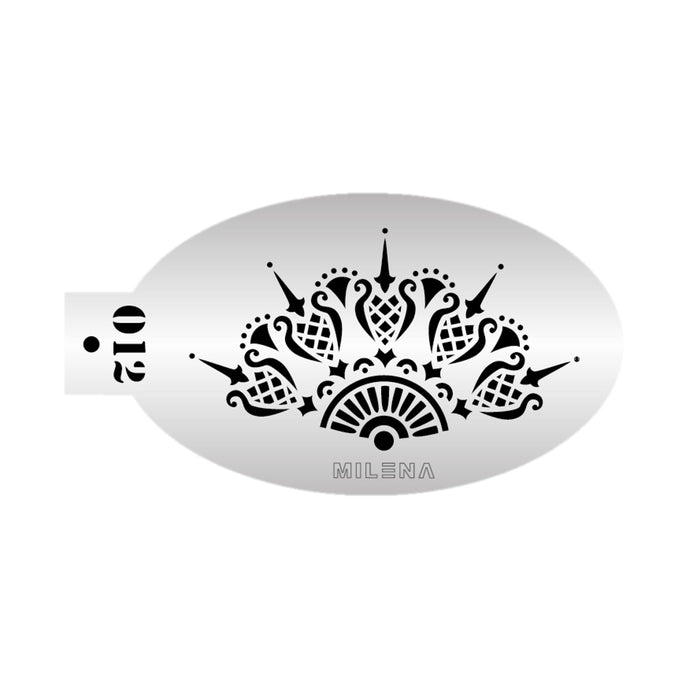
MILENA STENCILS | Face Painting Stencil - (Lace Crown) O12
6 in stock!
Easy 30-day returns for non makeup or Special FX items.
Read our full Return Policies for details

6 in stock!
What are the dimensions of this MILENA STENCILS Face Painting Stencil?
MILENA face painting stencils are 6.5cm x 12cm (about 2.5" x 4.7") and they are cut from a soft thin and flexible .15mm thick Mylar.
What is the Milena O12 Lace Crown stencil best for?
Looking to as some fast texture and detail to your face painting designs?! The Lace Crown looks beautiful around butterfly wings, on kitten faces, behind flowers, and of course, as the centerpiece to a princess look!
How to use MILENA Face Painting Stencils?
Face and Body Art stencils require some practice to learn how to use them properly, but once you learn how to use them you can get through your face painting line much faster! Start with a clean stencil and make sure that the skin is nice and dry before you apply the stencil. Hold the MILENA stencil against the skin firmly with your fingers. What paints to use? If you want yo work with water activated face paints, we suggest using a glycerin based paint like Superstar or Paradise for the easiest application, but with practice all water based face paints work. Get your sponge very slightly wet and work the paint into a creamy almost sticky consistency. Test the paint on the surface of your hand or napkin to make sure it isn’t too wet, and then tap over the surface of the stencil. Always move from the edges of the stencil into the center of the design, so that you are not pushing face paint under the stencil. You can also use cream based paints or pressed powders, or even use them both together, applying the cream based paint first and then tapping powder on top to set it. You can also tap glitter on top of the cream paint. Using sponges with very small pores is best since they provide a more even coverage and they tend to hold less water. Some people also like to use kabuki style brushes with their stencils, just make sure the brush has a very thin load of paint and it is fairly dry. Once it is time to remove the stencil carefully pull it away from the skin making sure not to drag the stencil against the freshly painted area. Before you use that stencil again, make sure to clean it and let it dry so it doesn’t ruin your next design. You can just rinse it off with water when on the job.
How to Clean my Milena Stencils?
All body art stencils are delicate tools and require lots of care to make sure you can use them for years to come. Before storing them make sure they are clean. Put the stencil under a gentle stream of water and then use a clean towel to softly wipe the surface of the stencil on both sides. Use gentle movements, so not to bend any parts of the stencil. You can remove stubborn stains with some soap. Pat the stencils dry using a towel and put them away.
What else Should I know about Milena Stencils?
MILENA Stencils were designed with the artistic flair of world renowned face painter Milena Potekhina. Her fine and creative line work has stopped other artists in their tracks while scrolling through facebook and instagram. Now you can have a little bit of Milena's magic in your face painting arsenal!
¿Cuáles son las dimensiones de este Milena Face Painting Stencil?
6.5cm x 12cm (about 2.5" x 4.7") .15mm Mylar.
¿Cómo usar MILENA Face Painting Stencils?
Las plantillas de Body Art requieren un poco de práctica para aprender a usarlas correctamente, pero una vez que aprendas cómo usarlas, ¡puedes cruzar la línea en tus trabajos y hacerlo mucho más rápido! Puedes usarlas para crear diseños muy simples solamente estampando el diseño presentado en la plantilla. Comienza con una plantilla limpia y asegúrate de que la piel esté en condiciones y seca antes de aplicar la plantilla, de lo contrario, la pintura se verá líquida. Aplica la plantilla TAP contra la piel. Ahora es el momento de aplicar la pintura. Debes asegurarte de trabajar siempre con la menor cantidad de agua posible para evitar que la pintura se filtre debajo de la plantilla. El uso de esponjas con poros muy pequeños es mejor ya que proporcionan una cobertura más uniforme y tienden a retener menos agua. Algunas personas también les gusta usar pinceles de estilo kabuki con sus plantillas, solo asegúrate de que el pincel tenga una carga muy delgada de pintura y que esté bastante seco.